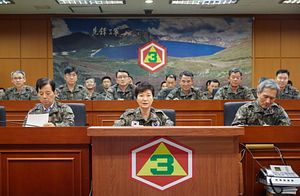It’s been a rough August so far for inter-Korea relations. On August 4, two Republic of Korea soldiers were maimed in a landmine explosion at the Demilitarized Zone (DMZ) between the two Koreas. The ROK determined that North Korea had planted the mines and, in retaliation, Seoul resumed its propaganda broadcasts near the border. On August 20, North Korea fired a shell across the DMZ, apparently aiming at the loudspeakers broadcasting South Korea’s anti-North propaganda. The South responded in kind. North Korean leader Kim Jong-un has since famously declared that his country’s armed forces along the militarized zone must “enter a wartime state to be fully battle ready.”
As The Diplomat’s Steven Denney noted, the latest round of brinkmanship is part of an old game – particularly given the timing. North Korea ups its provocations and rhetoric each year to protest the annual joint military exercises between the United States and South Korea. Still, the exchange of fire and a ramped-up North Korean military presence near the border has observers concerned.
On Saturday, however, the two governments took a solid step toward defusing tensions by holding their first high-level talks since February 2014. South Korean National Security Advisor Kim Kwan-jin and Hwang Pyong-so, a top military aide to Kim Jong-un, met in Panmunjom, a border village that is frequently the site of inter-Korean negotiations. The two sides held marathon talks from Saturday evening into Sunday morning. While no concrete steps were announced after the first round of talks, a North Korean ultimatum for Seoul to stop its propaganda broadcasts passed without incident.
The talks restarted again late Sunday afternoon, after a 13 hour pause to allow both sides to consult with their respective governments.
North Korea is demanding that the South halt its propaganda broadcasts, while Seoul insists that Pyongyang apologize for the early August landmine explosion. The North, meanwhile, has denied responsibility for planting the landmine, with state news agency KCNA saying that “the ‘mine explosion’ case was fabricated by the puppet military group keen on provoking the DPRK.” Pyongyang has similarly denied responsibility for starting Thursday’s exchange of fire.
Those positions seem mutually exclusive, but experts interviewed by South Korea’s Yonhap News Agency were optimistic. “I think the outlook is not that bad. At least a deal between South and North Korea can be reached to reduce military tensions,” Kim Yong-hyun of Dongguk University told Yonhap. The talks have in effect created a mini-truce, halting escalating tensions and hopefully allowing for both sides to find an off-ramp to the current stand-off.
Still, even as the talks continued, North Korea remained in a “quasi-war state.” South Korean defense officials said that over 50 North Korean submarines — 70 percent of the country’s submarine fleet — are away from their normal bases, a sign of increased war preparations. Pyongyang has also doubled its artillery troops along the border.
In response, South Korean President Park Geun-hye visited the headquarters of the 3rd ROK Army, which is responsible for guarding against an attack from the North. Park urged ROK troops “to maintain an impenetrable quick-response posture against any additional provocation by North Korea.” She added that, “should an incident occur, action should be taken accordingly first and then a report made.”

































